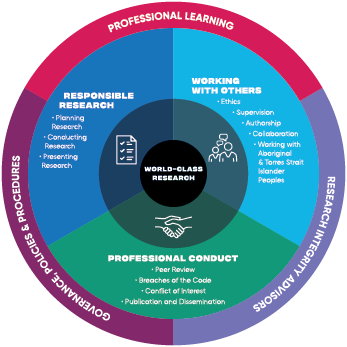
Ensuring Research Integrity in Open Science: Best Practices and Strategies
Ensuring Research Integrity in Open Science: Best Practices and Strategies https://opusproject.eu/wp-content/uploads/2023/08/Research-Integrity_347px.png 347 347 Open and Universal Science (OPUS) Project Open and Universal Science (OPUS) Project https://opusproject.eu/wp-content/uploads/2023/08/Research-Integrity_347px.pngEmbracing open science while upholding research integrity is a symbiotic relationship that propels scientific progress while maintaining the highest ethical standards. By transparently sharing methodologies and data, practicing pre-registration, embracing open peer review, prioritizing reproducibility and replication, implementing effective data management, fostering collaboration, and adhering to ethical considerations, researchers can ensure that open science remains a force for positive change in the scientific community. As open science continues to reshape the research landscape, the commitment to research integrity ensures that the pursuit of knowledge remains trustworthy, credible, and impactful.
- Transparent Methodology and Data Sharing
A cornerstone of research integrity in open science is the transparent sharing of methodologies and data. Researchers should provide comprehensive documentation of their experimental procedures, data collection methods, and analytical techniques. This transparency allows others to replicate and verify the results, minimizing the potential for bias or misinterpretation. By making all research processes accessible, open science encourages scrutiny and helps maintain the highest standards of research conduct.
- Pre-registration of Studies
Pre-registration involves publicly documenting research plans, hypotheses, and methodologies before conducting the study. This practice helps prevent outcome-based biases, selective reporting, and p-hacking. In open science, pre-registration enhances research integrity by committing researchers to a specific plan before data collection begins. It provides a clear roadmap for the study, making it easier to distinguish between planned analyses and post-hoc exploratory analyses.
- Open Peer Review
Peer review is a critical step in maintaining research integrity, ensuring that studies undergo rigorous scrutiny by experts in the field. Open peer review extends this process by making the reviewer’s identity and comments publicly available. This transparency not only enhances accountability but also allows for constructive feedback from a broader audience. Open peer review encourages fair evaluation, reduces potential conflicts of interest, and promotes honest, thorough assessments of research quality.
- Reproducibility and Replication
Reproducibility and replication are fundamental principles in research integrity. Open science places a strong emphasis on providing all necessary information to enable others to replicate research findings. Researchers should share detailed descriptions of experimental protocols, equipment used, and software codes to facilitate accurate replication. Encouraging replication studies within the open science community helps identify potential errors or inconsistencies and reinforces the reliability of original research.
- Data Management and Sharing
Effective data management practices are crucial for maintaining research integrity in open science. Researchers should establish clear data management plans, including data storage, organization, and documentation. Making raw data openly accessible allows others to validate findings and conduct independent analyses. However, privacy and ethical considerations must be taken into account, ensuring that sensitive or confidential information is appropriately protected.
- Collaboration and Community Engagement
Collaboration and engagement within the open science community contribute to research integrity. Researchers should actively participate in discussions, share insights, and collaborate on joint projects. Engaging in open forums, workshops, and conferences helps build trust and credibility within the community. Peer collaboration fosters collective problem-solving, reduces the risk of errors, and enhances the overall quality of research outputs.
- Ethical Considerations and Review
Adhering to ethical guidelines is paramount to research integrity. Open science researchers should obtain ethical approvals for their studies involving human subjects, animals, or sensitive data. Transparently reporting any potential conflicts of interest, funding sources, and ethical considerations ensures a comprehensive understanding of the research context. Ethical compliance demonstrates a commitment to responsible research conduct and strengthens the credibility of open science endeavors.
Headline picture: ECU Intranet
- Posted In:
- Open Science News




